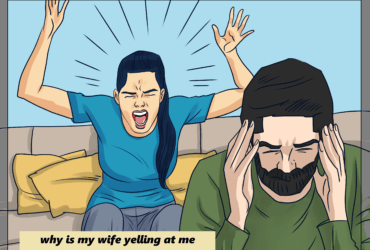Why Is My Husband Yelling at Me – When your husband yells at you, it can be hurtful and confusing. It’s natural to wonder why this behavior is happening and how to address it. Understanding the root causes behind yelling can help foster better communication and strengthen your relationship.
Common Reasons Behind Yelling
- Stress or Frustration
- Life’s challenges, such as work pressure, financial worries, or health concerns, can lead to pent-up emotions. Sometimes, yelling becomes a way to release that tension.
- Lack of Communication Skills
- Some people resort to yelling when they feel unheard or are unsure how to express their emotions constructively.
- Feeling Overwhelmed
- Household responsibilities, parenting, or other commitments can become overwhelming, causing a short temper or reactive outbursts.
- Unresolved Conflicts
- Past arguments or unresolved issues might resurface, leading to frustration that manifests as yelling.
- Personality or Learned Behavior
- If your husband grew up in an environment where yelling was common, he may view it as a normal way to express anger or disagreement.
How Yelling Impacts a Relationship
Yelling can have significant effects on a relationship, including:
- Emotional Distance: Constant yelling can create resentment and push partners apart.
- Eroding Trust: It can make you feel unsafe or unsupported in the relationship.
- Miscommunication: Yelling often drowns out the message, making it harder to address the real issue.
How to Address the Situation
1. Stay Calm and Composed
- Responding with anger can escalate the situation. Instead, try to remain calm and avoid yelling back.
2. Choose the Right Time to Talk
- Address the issue when both of you are calm. Avoid discussing it during or immediately after an argument.
3. Express Your Feelings
- Use “I” statements to express how his yelling makes you feel. For example, “I feel hurt when you raise your voice at me.”
4. Identify Triggers
- Try to identify patterns or situations that lead to yelling. Understanding triggers can help you both navigate conflicts better.
5. Encourage Healthy Communication
- Suggest ways to communicate without yelling, such as taking a break during heated moments or using a softer tone.
6. Seek Professional Help
- If yelling becomes frequent or emotionally damaging, consider couples therapy or counseling. A professional can help both of you understand underlying issues and develop healthier communication strategies.
When Yelling Becomes a Red Flag
If yelling is accompanied by:
- Verbal Abuse: Insults, name-calling, or belittling.
- Physical Threats: Signs of intimidation or aggression.
- Control: Attempts to manipulate or dominate you emotionally.
These behaviors may indicate a deeper issue, and it’s essential to prioritize your safety. Seek support from trusted friends, family, or professionals.
Moving Forward Together
Relationships aren’t perfect, and conflicts are a natural part of any partnership. However, addressing yelling with understanding and mutual effort can lead to a healthier and more supportive bond. Remember, it’s okay to seek help and advocate for your emotional well-being.
Would you like tips on calming techniques or how to initiate a deeper conversation with your partner?











Leave a Reply